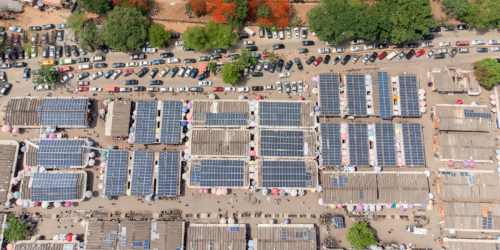When complete, the Wuse Market solar DER in Abuja, Nigeria, will power 2,500 shops, eliminating the need for fossil backup generators.

This report provides new analysis that shows the Global South is in fact adopting cleantech faster than the Global North. In Powering Up the Global South, RMI illustrates that Global South countries are deploying cleantech rapidly and will continue to do so as their path to growth.
The research shows that three-quarters of the Global South’s energy demand is in the “sweet spot” of change based on their level of fossil fuel imports, income, energy demand, and available renewable resources. The research finds:
- With 60 percent of the global population, the Global South has only 20 percent of fossil fuel production and reserves, and oil and gas production are in decline. As a result, it is already a net importer of fossil fuels. In contrast, the Global South is rich in renewables, with 70 percent of global renewable potential.
- In 2024, 87 percent of capital expenditures on electricity generation will go into clean energy. Over the past five years, solar and wind generation in the Global South has grown on average at 23 percent annually, now supplying 9 percent of its electricity. Global South solar and wind adoption is only five years behind the Global North.
- One-fifth of the Global South, from Brazil to Morocco and Namibia, from Bangladesh to Egypt and Vietnam, has already overtaken the Global North in terms of the share of solar and wind in electricity generation, or the share of electricity in final energy.
While there are grounds for optimism, more action is needed to speed up change. Solutions include domestic policy, reform of development banks, catalytic and concessional finance directed especially to poor and vulnerable countries, and technology transfer. As COP29 approaches, now is the time for countries’ policies to reflect the new economic reality of cleantech.
